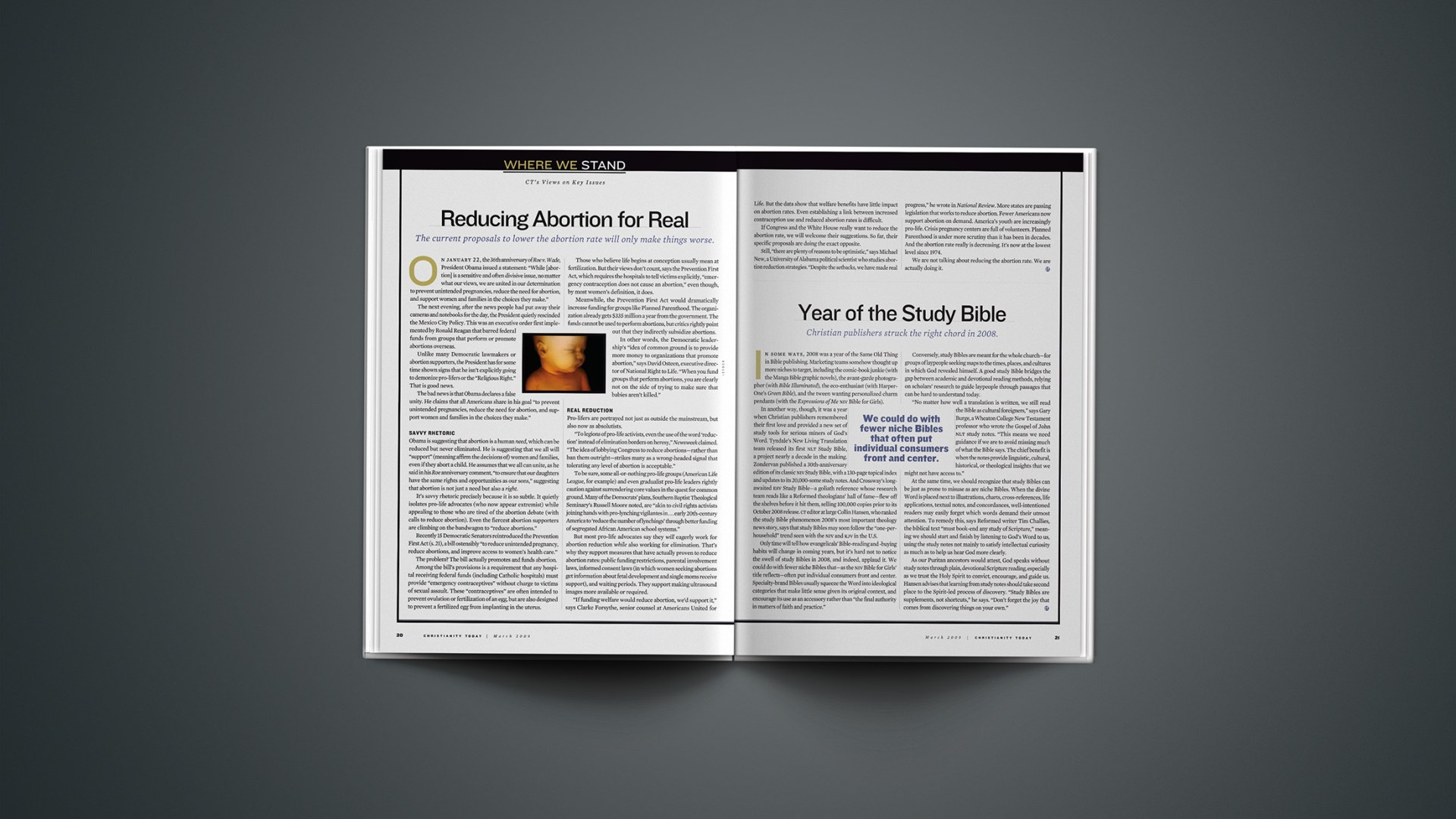On January 22, the 36th anniversary of Roe v. Wade, President Obama issued a statement: “While [abortion] is a sensitive and often divisive issue, no matter what our views, we are united in our determination to prevent unintended pregnancies, reduce the need for abortion, and support women and families in the choices they make.”
The next evening, after the news people had put away their cameras and notebooks for the day, the President quietly rescinded the Mexico City Policy. This was an executive order first implemented by Ronald Reagan that barred federal funds from groups that perform or promote abortions overseas.
Unlike many Democratic lawmakers or abortion supporters, the President has for some time shown signs that he isn’t explicitly going to demonize pro-lifers or the “Religious Right.” That is good news.
The bad news is that Obama declares a false unity. He claims that all Americans share in his goal “to prevent unintended pregnancies, reduce the need for abortion, and support women and families in the choices they make.”
Savvy Rhetoric
Obama is suggesting that abortion is a human need, which can be reduced but never eliminated. He is suggesting that we all will “support” (meaning affirm the decisions of) women and families, even if they abort a child. He assumes that we all can unite, as he said in his Roe anniversary comment, “to ensure that our daughters have the same rights and opportunities as our sons,” suggesting that abortion is not just a need but also a right.
It’s savvy rhetoric precisely because it is so subtle. It quietly isolates pro-life advocates (who now appear extremist) while appealing to those who are tired of the abortion debate (with calls to reduce abortion). Even the fiercest abortion supporters are climbing on the bandwagon to “reduce abortions.”
Recently 15 Democratic Senators reintroduced the Prevention First Act (s. 21), a bill ostensibly “to reduce unintended pregnancy, reduce abortions, and improve access to women’s health care.”
The problem? The bill actually promotes and funds abortion.
Among the bill’s provisions is a requirement that any hospital receiving federal funds (including Catholic hospitals) must provide “emergency contraceptives” without charge to victims of sexual assault. These “contraceptives” are often intended to prevent ovulation or fertilization of an egg, but are also designed to prevent a fertilized egg from implanting in the uterus.
Those who believe life begins at conception usually mean at fertilization. But their views don’t count, says the Prevention First Act, which requires the hospitals to tell victims explicitly, “emergency contraception does not cause an abortion,” even though, by most women’s definition, it does.
Meanwhile, the Prevention First Act would dramatically increase funding for groups like Planned Parenthood. The organization already gets $335 million a year from the government. The funds cannot be used to perform abortions, but critics rightly point out that they indirectly subsidize abortions.
In other words, the Democratic leadership’s “idea of common ground is to provide more money to organizations that promote abortion,” says David Osteen, executive director of National Right to Life. “When you fund groups that perform abortions, you are clearly not on the side of trying to make sure that babies aren’t killed.”
Real Reduction
Pro-lifers are portrayed not just as outside the mainstream, but also now as absolutists.
“To legions of pro-life activists, even the use of the word ‘reduction’ instead of elimination borders on heresy,” Newsweek claimed. “The idea of lobbying Congress to reduce abortions—rather than ban them outright—strikes many as a wrong-headed signal that tolerating any level of abortion is acceptable.”
To be sure, some all-or-nothing pro-life groups (American Life League, for example) and even gradualist pro-life leaders rightly caution against surrendering core values in the quest for common ground. Many of the Democrats’ plans, Southern Baptist Theological Seminary’s Russell Moore noted, are “akin to civil rights activists joining hands with pro-lynching vigilantes in … early 20th-century America to ‘reduce the number of lynchings’ through better funding of segregated African American school systems.”
But most pro-life advocates say they will eagerly work for abortion reduction while also working for elimination. That’s why they support measures that have actually proven to reduce abortion rates: public funding restrictions, parental involvement laws, informed consent laws (in which women seeking abortions get information about fetal development and single moms receive support), and waiting periods. They support making ultrasound images more available or required.
“If funding welfare would reduce abortion, we’d support it,” says Clarke Forsythe, senior counsel at Americans United for Life. But the data show that welfare benefits have little impact on abortion rates. Even establishing a link between increased contraception use and reduced abortion rates is difficult.
If Congress and the White House really want to reduce the abortion rate, we will welcome their suggestions. So far, their specific proposals are doing the exact opposite.
Still, “there are plenty of reasons to be optimistic,” says Michael New, a University of Alabama political scientist who studies abortion reduction strategies. “Despite the setbacks, we have made real progress,” he wrote in National Review. More states are passing legislation that works to reduce abortion. Fewer Americans now support abortion on demand. America’s youth are increasingly pro-life. Crisis pregnancy centers are full of volunteers. Planned Parenthood is under more scrutiny than it has been in decades. And the abortion rate really is decreasing. It’s now at the lowest level since 1974.
We are not talking about reducing the abortion rate. We are actually doing it.
Copyright © 2009 Christianity Today. Click for reprint information.
Related Elsewhere:
More coverage of abortion is available in our life ethics area.










